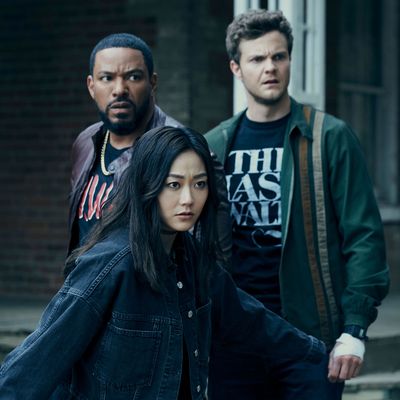
“Barbary Coast” is easily the most focused episode so far of the third season of The Boys: It presents two streamlined storylines encompassing most of the cast, with a few side stories for supporting characters. But despite a few excellent moments, it’s also my least favorite so far, retreading some old ground without leaving enough room for this season’s most overlooked characters.
Like the last episode, we begin and end with Homelander and Starlight, though this time the point of view we see is Starlight’s. American Hero is coming to an end, and it’s finally time to fill the two empty slots in the Seven — but Starlight doesn’t get the chance to really flex her new power because Homelander’s approval numbers are actually up 21 points after his birthday blow-up (at least with white males in the Rust Belt). In fact, Homelander doesn’t really feel threatened at all by his new co-captain anymore; Ashley has made him realize that the appeal of Homelander and the (opposite) appeal of Starlight can actually work well in concert. Not even Maeve’s blackmail plane footage fazes him anymore, and what leverage does Starlight really have without that?
“Barbary Coast” is about Starlight losing control and having to just grin and bear it. She’s eager to fill the Seven with qualified heroes she can actually work with, like Silver Kincaid. But nobody at Vought wants a Muslim superhero, and the choice is ultimately made for her: Homelander wants Supersonic to take the first slot and the Deep to make a surprise return for the second. And when Homelander wants something, he gets it.
Starlight taking attention from Homelander was starting to hew a little too close to his rivalry with Stormfront in early season two before he’d come around to her way of thinking. But it’s also a tad boring to see him retake power in essentially the same way he did after joining Stormfront. Stormfront reminded him that being feared by the masses can be more powerful than being loved; in “Barbary Coast,” he regurgitates that lesson yet again, insisting, “I’d prefer to be loved. But if you take that away from me, being feared is A1 okey-doke by me.” In fact, if Starlight does anything he doesn’t like, he can kill everyone she’s ever loved and turn the United States into a post-apocalyptic wasteland in the space of an afternoon.
I imagine it’s difficult to write an ultra-powerful villain like Homelander, someone infallible to the point that it’s impossible to gain any lasting leverage over him. That’s one of the main stories of The Boys, and the series has handled it surprisingly well so far. I have no doubt season three will continue to find new wrinkles to the character and his power dynamics with the rest of the cast. But it’s still a tad frustrating to see him reclaim power over Starlight so quickly, and the Deep’s return to the Seven emphasizes that feeling of stasis.
Still, a lot of this works great when it comes to developing Starlight’s crisis of conscience and the gap between her lofty ambitions and what’s actually possible in her new power position. The episode opens with a flashback to a young Starlight’s reluctant superpowered performance of “Hit Me Baby One More Time” during a hero pageant, clenching one fist behind her back so she doesn’t unleash the blast of power she wants to. That image finds its mirror years later when Homelander makes the surprise TV announcement that he and Starlight are in love(!) and she goes so far as to enthusiastically kiss him. (#Homelight.)
This is Starlight doing what her mother taught her to do: keep smiling and do whatever it takes to win. Earlier in the episode, Hughie asked her to stick it out and buy them some time; this surely isn’t what he had in mind, but it fits. And as always, Erin Moriarty does a great job keeping the fear just barely visible through her projected excitement.
“Barbary Coast” is also a very transitional episode, setting up the next phase of the season with a visit to the home where Grace Mallory is keeping Ryan safe. Butcher, privately struggling to control the side effects of his V24, wants an explanation for Mallory’s connection to Soldier Boy.
So the episode devotes several scenes to a big info dump about Mallory’s time in Nicaragua during the Iran-Contra affair. Mallory was a case officer helping Contra rebels fight Russian-backed Sandinistas, an effort funded by selling arms to Iran and trafficking cocaine to minority neighborhoods in the U.S. It’s pretty wild to see this very real (minus the supes) and unflattering piece of American history acknowledged so openly on a mainstream TV show, and I appreciate that the episode condemns Mallory’s role, even if she’s still a relatively sympathetic character.
Eventually, Vought partnered with the government in the war on communism, and Payback was brought to Nicaragua to help. But their irresponsibility led to Mallory’s men getting massacred, Black Noir’s face getting severely scarred, and Soldier Boy being killed and taken by the Russians. Vought got full immunity, of course, which kicked off Mallory’s quest for revenge — and led to the original formation of the Boys.
Butcher is pissed that Mallory never told him about a potential weapon that could kill Homelander, but she’s also right that so much of his motivation comes from his own insatiable rage, not any real noble cause. Unfortunately, that pushes Butcher into a full regression, telling Ryan he can’t stand looking at him after what he did to Becca. It’s clear from the soft look in Karl Urban’s eyes that Butcher doesn’t actually want to push Ryan away; he just needs to focus, unencumbered by distractions. But it’s still a bit of a disappointing return to the old Butcher.
Compared to this stuff, Frenchie’s subplot feels pretty slight. He sees his old partner in crime, Cherie, who’s working again with their old employer, a Russian gangster named Little Nina (Katia Winter). Now Cherie is on the run after being robbed of the drugs she was supposed to be moving, and she wants Frenchie to come with her. He refuses, though he also refuses Nina’s bribe to give her Cherie’s location. When Butcher hears what went down, though, he asks Frenchie to set up a meeting after all. They’re going to Russia.
All of this works well enough to set up the Boys’ next adventure, but it’s hard not to consider the other stories we could be seeing play out. Maeve was one of the strongest characters of the first two seasons, but she’s been woefully sidelined so far. At least we get a brief glimpse of A-Train, who’s starting to think more seriously about the good he can do for the Black community. Unfortunately, he’s stuck in a binary way of thinking, insisting that he’s “Michael Jordan, not Malcolm X.” If he does want to speak up about racism in the supe sphere, it’ll require more time — and extra time is one thing “Barbary Coast” doesn’t have.
Extra Frames
• Starlight tells Supersonic about Homelander’s true nature, trying to convince him not to join the Seven. But it backfires because he wants to stick around to have her back. It’s a swoon-worthy moment and indicates that The Boys is setting Supersonic up as a real love interest. At the same time, Starlight’s actual boyfriend actively requests that she stay in a deeply dangerous situation. And while all this is happening, she starts a new public relationship with Homelander, making this a twisted sort of love square.
• Relatedly, a meta line: “Love triangles generate a 47 percent surge in trending topics on social platforms.”
• Kimiko gets a nice scene bonding with Ryan over hating their powers, though I do wonder what’s next for the character besides her futile desire for a normal life.
• The funniest line delivery of the episode might be Colby Minifie’s befuddled reaction to Starlight choosing Silver Kincaid: “But she’s from Af … ghan … i … stan?”
• Kimiko breaking Hughie’s arm was predictably hard to watch, but the Deep being forced to eat his octopus friend Timothy was straight-up excruciating. I’m a little lukewarm on the recent Deep hijinks, especially when they’re gross just to be gross, but I guess this is Homelander reminding him who’s boss. I’m just not sure it’s a lesson he, or the show, needed.
• As a young Stan Edgar, Justiin Davis impressively mimics Giancarlo Esposito’s cadence. It also totally tracks that he’d deny Black Noir’s request to go unmasked as a Black supe in the ’80s.


